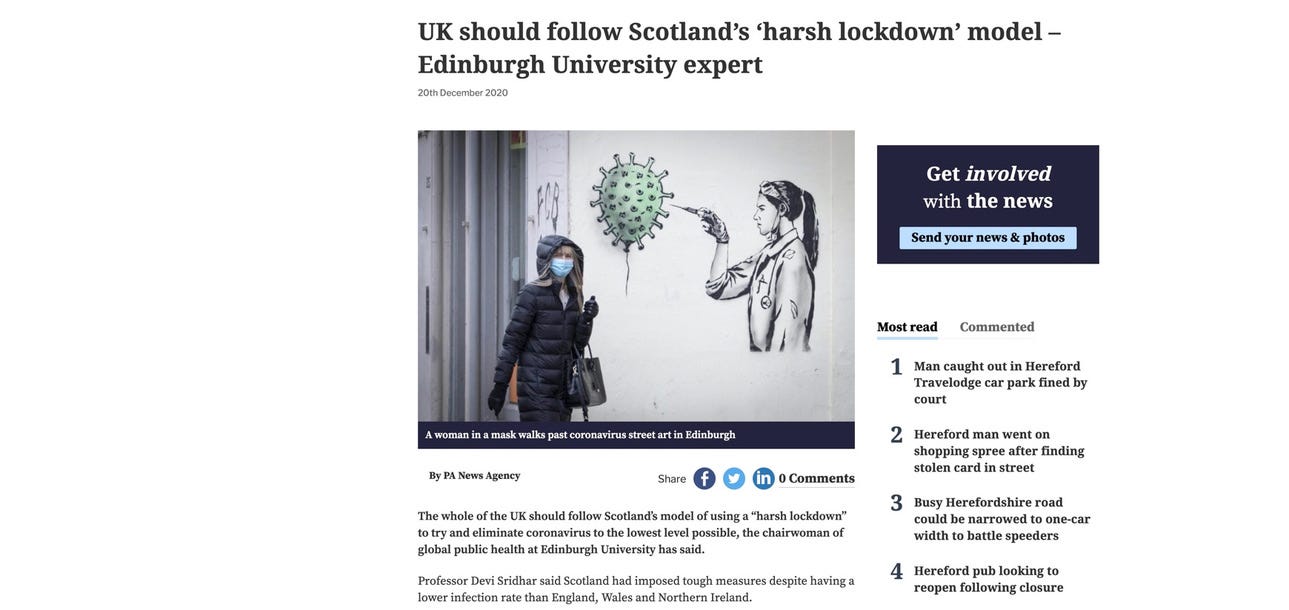Professor Brass Neck is Back
Devi Sridhar became an icon of the pandemic. Yet her rise to fame was based on a lie. She didn't predict the sort of pandemic we've just experienced. This was the first of many misrepresentations
She’s back.
Like a bad memory.
Devi Sridhar, who is to modesty what the Sackler family were to honest scientific research, has squeezed in another self-satisfied bout of pontificating. Good of her to make the time… in between saving the planet and applauding her hero Nicola Sturgeon (whoever she is).
In the article in the Herald, Sridhar, who lambasted the looser restrictions in Sweden at the height of the pandemic, now attempts to explain why there were fewer excess deaths in Sweden then in the UK. That’s because, she says, there is less deprivation, inequality and obesity in Sweden than in the UK. Whatever we had done, Sridhar says, we’d still have had a worse outcome. This rather begs the question why she and her fellow strict-lockdown enthusiasts didn’t warn us of this eventual outcome at the time.
The problem with Sridhar’s logic is that lockdowns of the sort we had in the UK…exacerbate all three of the social problems she blames for the high excess deaths. Indeed, these three horses of the apocalypse are responsible for huge ill-health generally. Make obesity or deprivation worse then you can guarantee you’ll cause more deaths. That’s why, even if you were in favour of some restrictions -at first anyway until we knew more about the virus- it still made sense to try to keep as many people in paid work and moving around as possible.
By contrast the Scottish government endlessly sought to trump any restrictions in the rest of the UK, to give the impression they were tougher on the virus. Construction was a perfect example of work that could not be done at home…or by zoom. Yet Scotland closed all construction sites when the rest of the UK decided to keep them open.
Of course Scotland could only afford to do that because evil, horrid Westminster was paying furlough. It was the Scottish economy that suffered though since furlough for thousands of workers meant reduced spending power -or savings- in the economy. Closure of sites had also a huge impact on long chains of suppliers. A government that really cared about the economy would have used lockdown as the perfect time to rush to complete infrastructure while the rest of the economy was closed. The UK did. Scotland didn’t.
Sridhar, safe in her taxpayer-paid sinecure, chose to be chief cheerleader for all Sturgeon’s restrictions, constantly echoing Her Master’s Voice, that the UK wasn’t being tough enough.
The result was that many more businesses have ended up shuttered forever in the UK where all restaurants, bars and non essential retail had to close than in Sweden where they could stay open, along with gyms and schools. It was utterly predictable that inequality would be made worse. Poor kids need schools more than wealthy ones. In the UK, wealthy people with large houses and gardens were bound to suffer less than those in council flats during a strict lockdown. How were working class kids, who had no school or library access, supposed to flourish in cramped conditions at home? As for the UK’s obesity, how would closing fitness facilities and gyms help counter that?
What Sridhar is doing now is cherry-picking data and rewriting history to justify the one fits all prescription she promoted of maximum restriction and lockdown. This leads her wilfully to ignore the fact there is much about the pandemic’s impact on different countries that remains unexplained. Sridhar now praises Japan, for example, because it had a low COVID death rate. Yet for the first year of the pandemic Japan actually ignored -or got wrong- all the things Sridhar was advocating.


Whisper it gently. Obesity is even lower in Japan than Sweden.
Sridhar’s latest pearls of wisdom about Sweden were reported in the Herald by Helen McArdle, the Health Correspondent who doesn’t manage to ask a single searching question. I suppose we shouldn’t be surprised. This is Scotland where questions are considered terribly impertinent.
It’s almost as if McCardle or her Editor is a rather good friend of Sridhar. In a small country like Scotland this is often the case. The number of people who make decisions and claim to hold them to account is tiny. In the UK as a whole there are many and disparate competing circles of influence, associated with business, political parties and genuinely independent institutions. In Scotland, with a political establishment that is contemptuous of business, a media that is on life support, and institutions that function too often as some sort of carbon capture scheme, recycling government emissions, the circles of the Venn diagram of influence overlap alarmingly. If a journalist puts noses out of joint in one they’re likely to find themselves persona non grata in all of them.
The recent leaks of Matt Hancock’s WhatsApp messages reveal how many decisions we were told were based on science actually were highly political. The politicisation of the pandemic reached dizzying heights in Scotland. The COVID briefings given by Nicola Sturgeon became a daily exercise in news management, used to try to wrongfoot or outwit Westminster.
Sridhar was only too happy to oblige the SNP by becoming an overtly partisan champion of its government and agenda. At one stage she even argued that Zero COVID in Scotland was being “hampered by UK control over furlough and borders”. Check the writer of that piece. Isn’t that Helen McArdle? Again...
Sridhar was also more than happy to wax lyrical on TV about “what the Scottish government is doing right and the UK is doing wrong”.
This sycophancy became distinctly creepy. In an interview in the Spectator, Sridhar revealed that when it became known that she was using her spare time during lockdown to qualify as a fitness instructor, she said, “the First Minister asked to become her first client”.
I bet she did.
You’d think her closeness to power would lead her to being conscious about how this might be misinterpreted. No good scientist wants the impression to be given that they’re for hire. Sridhar didn’t seem to care what impression was given. When during the Scottish elections, BBC Radio ran excerpts from her book ‘Preventable’ about the pandemic , critics called it out. The book continued Sridhar’s hero-worship of Sturgeon and so, the critics rightly argued, this might influence elections. Impartial? No I don’t really think so. The BBC apologised.
What was Sridhar’s response? A shamelessly tetchy moan about how she was being prevented from saying nice things about Scotland. She suggested she’d be prevented from saying “anything positive about Scotland”. She really did suggest praising the performance of a party political leader during an election was akin to saying Scotland had “lovely lochs”. You’d think an actual Professor could grasp the difference.
It’s Sridhar’s lack of self awareness that helps explain her remarkable prominence during the pandemic. She shamelessly muscled her way to the front of a vanishingly small queue to become the mouthpiece of Scotland’s pandemic groupthink. Yet her story was always full of holes.










